This basketball coach and FIBA Hall of Famer talks about his journey of many decades in basketball, from the moment when, as a boy, he first threw a ball into a basket, via 26 trophies as a coach, to today, when he has been engaged by the FIBA Technical Commission
Dušan Ivković (75) has called time on his coaching career, but he hasn’t said goodbye to obligations in basketball. As a member of the Technical Commission of the World Basketball Federation (FIBA), where they seek the best solutions for the future of basketball, he tries to draw attention to the problems faced by this sport. He says that his duty is to always be a “basketball soldier”, considering what the sport has provided for him over the past six decades. In all the interviews he’s given at various meridians, his first role in basketball has somehow remained in the shadows, and that was the role of a player.
“I entered the world of basketball in the mid-1950s when it was the subject of ridicule in Yugoslavia. They said back then that basketball was a girls’ sport, that it’s played with the hands rather than the feet, like football, and that there’s no fisticuffs and similar things befitting to men. Basketball attracted me at first glance. Perhaps that was also due to the fact – as pointed our by long-serving FIBA secretary general FIBA Bora Stanković – that basketball is the only sport that has a horizontal goal. And that requires a special skill. As a boy, I had the opportunity to watch our first basketball aces, like Aleksandar Gec and Srđan Kalember from Red Star, then Partizan’s famous centre Mirko Marjanović, a great gentleman with whom I later collaborated well as a young coach at Partizan. During those days when I started playing basketball, in 1955, was the first time someone over two metres tall appeared on our basketball scene, Konjević, who was brought to Red Star by the famous Nebojša Popović.”
As a child, what other sports, apart from basketball, interested you?
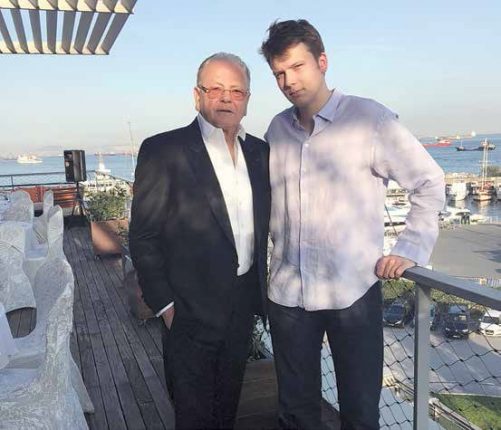
The Red Cross neighbourhood and the Workers (Radnički) Club are, so to say, my life. As we didn’t have a television as kids, we went to watch all the sports. I was about the height of the ring when I first started sneaking around and watching boxer greats, from Ljubinka Veselinović in the flyweight category, to heavyweight Boško Nikolić. I met all the boxing legends and admired them, as well as the footballing “masters from the Danube” who trained on our clay field, led by Škoba Filipović. That unbelievably charismatic coach created a team that earned the prefix “atomic”. I remember that in one training match they beat the Bulgarian national team 4:0. Testifying to what a master of his craft Škoba was are the words of the then president of the Workers Club Čile Kovačević, who said: “Put him in jail and give him a football, and he’ll teach the inmates to play the best football”. And what can one say about handball maestro Bogdan Cvjetić, or David Kalinić and Vinko Kandija, who created a women’s handball team that took Europe by storm… All the great boxing champions were moulded by the legendary Siki Gaković, who fired up the fighters in an unbelievable way. Then came Toma Hladni and Dule Sertić. Like every boy, I tried my hand at many sports, and my first love was boxing. However, my father forbade me from training boxing, and so at the age of 12, in 1955, I switched to basketball. My first instructor was Bora Cenić.
My behaviour during matches isn’t acting, as many consider. There’s no time for acting. I’ve never used chill pills, although I look as cool as a spritzer. That’s because my nerves are spent long before the match, in the exhausting days of preparation. Leading a match is the nicest part of the job
Why are all you “crossers” so proud of the Red Cross neighbourhood?
The Red Cross gave us everything, including some kind of upbringing, besides that of the family. It had a playground, Mile Bric, in whose shop I met, as a boy, all sporting legends, the Juhor tavern, Avala cinema and the Belgrade Drama Theatre. That’s why it’s no surprise that we have so many high-quality and distinguished people, from scientists and artists, to top actors and athletes. As a kid, I hung out with older company, who had some of their own regular rituals. It was known that we would first go with girls to Juhor, and then – when Juhor was demolished – to “Mlava”, and from there each went their own way.
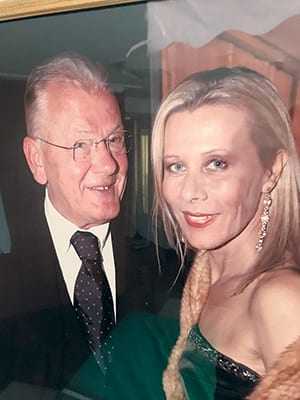
In the late hours, just us men would meet, and then stories emerged that would later turn into legends recounted by the whole of Belgrade. We didn’t like “Madera” restaurant and those football circles, and we weren’t even interested in them. I remember we barged into the theatre, admired Bats Živojinović, Oliver and Rade Marković, Cigi Jerinić, Cici Perović and the others who were led masterfully to the peak from one play to the next by director Bata Putnik.
When it comes to sport, the Red Cross was a kind of academy, because it yielded champions in several sports. For example, at the University Games in Zagreb in 1987, the greatest successes were brought by coaches from Red Cross: Milan Ciga Vasojević, Lazar Grozdanović and me. Our homes were within a hundred metres of one another.
Considering that you were born (as the fourth and youngest child) in a home located virtually across the road from the basketball court in the Red Cross neighbourhood, it seems that you were fated to play basketball. However, you couldn’t have inherited such a gene from your father (a doctor of law) and your mother (a poet).
We had a very difficult childhood. We barely survived. My father, a pre-war doctor of law, the head of a typical urban family, was completely degraded in the new communist system. He retired to an invalid’s pension very early and devoted himself to beekeeping and honey making. In fact, bees fed us. That’s why the three symbols of our family are bees, pigeons and basketball.
“I’m the only coach who didn’t accept to become a professional. That’s because if, in 1987, I’d accepted that and cancelled my contract with Vojvodina, I would have had a salary of 70 million then dinars from the Basketball Federation of Yugoslavia, which would have meant that I wouldn’t have been able to scrape together money to take the family on holiday.”
I fell in love with pigeons and basketball alongside my brother, Piva (Slobodan), who wasn’t only the greatest coach I knew, but also an expression of universal talent: he painted, sang, played music… He could have been whatever he wanted. I’ve transposed our entire family story into a family crest that was made according to my concept: two pigeons – that’s Piva and myself – than a basketball net in the form of a honeycomb and a bee, which gave us life. My mother wouldn’t mind that she isn’t there at first sight, because there’s enough poetics in all of it, so it seems like one of the mother’s verses.
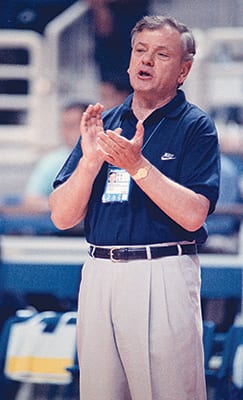
When it comes to family, you are also proud of being related to Nikola Tesla?
My great-grandfather, Trivun, and Tesla’s mother, Georgina, were brother and sister. Tesla sent a gold coin from America to every child born in the family. I was the only one in our family not to get a ducat, because Tesla died on 7th January 1943, and I wasn’t born until November that year. During those difficult years, those gold coins fed us. I wish that at least some of them remained, but my mother sold them out of necessity.
How much credit does your brother Piva deserve for your concept of basketball?
It was with Piva that I started playing basketball, which our father didn’t support. Our father, who had raised us in the Spartan spirit, said to our mother, “I don’t understand why those two jump around like monkeys and throw the ball into the basket.” Piva persisted in basketball and became the best and most original coach because he could make an ace out of an average player. Nevertheless, he didn’t have that much of an impact on me becoming a coach, because as soon as he returned from the Army in 1964, Bora Stanković took him to OKK Belgrade. We later worked together, when he led the Workers first team, and I led the younger categories. I learned a lot from him, though we are essentially opposites. He is a romanticist, while I’m a realist.
Why didn’t you work in the area you were educated for?
When I enrolled in the Faculty of Mining and Geology, we founded the University Club, whose players included, amongst others, Branislav Novčić [CorD founder and aim president]. Our coach was Bora Cenić. We travelled to London, the Middle East etc. When I completed my geology studies, I was offered an engineering post in Sarajevo. However, I didn’t spend a single day doing what I’d been trained to do.
I opted for basketball and the coach’s calling which is in some ways a mining job. I started as a coach in 1968 when I signed the first scholarship contract. Four years later, upon returning from the army, I independently led the Radnički juniors and won the Championship of Yugoslavia with them. My first contact with the national team was in 1976 when I was an assistant to Luka Stančić at the European Youth Championships in Spain.
The breakthrough moment for my coaching career was my move to Partizan in 1977 when I was invited to be the assistant of Ranko Žeravica. Already by the 1978/79 season, I’d independently won the triple crown – championship, cup and Korać Cup – without Dražen Dalipagić, who was serving in the army.
Like Serbian (Yugoslav) basketball, you traversed the path from an outsider to world power. What did that look like in your case?
Nobody even dreamt that we’d be a world power in basketball. We played during the summer, but it wasn’t possible in winter because there was no infrastructure. Our league moved into halls in 1967 and soon became the best in Europe. Phenomenal basketball, without foreigners and with only domestic players who, according to the regulations of the time, weren’t allowed to go abroad until they turned 28… From 1979 to 1992, the champions of Europe were Bosnia, Cibona twice, Jugoplastic three times and PPartizan.
The best fivesome comprising players coached by Ivković is as follows: Dragan Kićanović, Dražen Petrović, Dražen Dalipagić, Krešimir Ćosić and Vlade Divac. All five of them, like Ivković himself, are members of the FIBA Hall of Fame, while Dalipagić, Ćosić and Petrović are also members of the Naismith Memorial Basketball Hall of Fame
The clubs worked at extremely high quality, and a model of basketball was created that is still present today – that which we call the Yugoslav school of basketball.
However, it worries me that ever fewer players are being produced now. This is a consequence of the lack of high-quality leagues and competitions in which we could give youngsters a chance to progress. In today’s circumstances it’s not possible to create the kinds of aces that I was fortunate enough to lead over several generations, such as Dalipagić and Kićanović at the beginning of my coaching career, then Petrović, Paspalj, Divac and other top players of the ‘80s and ‘90s, or Teodosić and Bogdanović toward the end of my career.
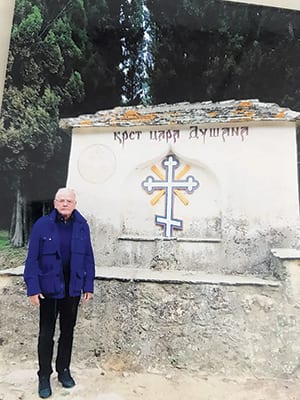
You have amassed 20 club trophies and six medals with the national team, four of which are gold. What fills you with the most pride?
It’s difficult to set something apart from all of that. As I said already – I never worked in the area I was schooled for. From a great love for basketball, I began my work as a coach and did that job until I was 73, which is a huge privilege. It’s difficult to say how lucky I am, considering that I coached entire generations of the world’s greatest stars. That’s why it wouldn’t be fair to reduce an entire career down to one or two things. There are things that can’t be measured in medals and trophies, such as the friendships that basketball brought me. Likewise, my heart is filled when I now see performing in the NBA players who I gave a chance during their teenage days. For instance, Korkmaz was playing for me at Efes in the EuroLeague at the age of 17. Mihalis Romanidis at one point, while I was coaching Aris, was the youngest debutant in the Greek league, at the age of 15. If you ask me about the greatest impression of my career, that’s probably the fact that basketball and God gave me an entire life in which I was surrounded by young, talented people who had a positive impact on me, but who I – as they themselves say – helped to become wonderful people and great basketball players.
Today, as a member of FIBA’s Technical Commission, you work to ensure basketball is heading towards the future in the right direction.
A few of us who have specific experience, whom basketball has given us a lot, have a chance today, when we’re not in the focus of interest, to give something back to our great, lifelong love. Basketball is in a huge crisis, primarily a crisis of relations. I support FIBA’s idea of “windows” in qualifying for the World Cup, I support windows as a chance for the local public to be presented to national teams, which haven’t had a chance to play at home for 20-30 years. However, a huge gap has emerged, primarily when it comes to scheduling matches.
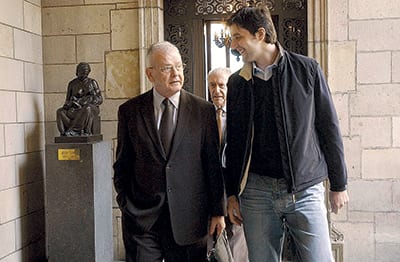
There is no unity whatsoever between FIBA and the EuroLeague. Under such circumstances, some teams will qualify for the World Cup, while some will have paid the price for such a schedule. An injustice has been perpetrated against players who came to the aid of the national team and secured qualification for the World Cup, while others will play in the tournament.
As a member of the Technical Commission, I participate with great interest to advance this sport, but I see a lot of people who don’t have the capacity for great things. There are still a lot of retired referees in those forums, people who have a very poor understanding of basketball. To be fair, they have a good understanding of the rules, but they managed to declare rolling as taking steps and thus destroyed one of the best moves in basketball… I’m very keen to give some suggestions because I think I know and understand this sport well. A lucky circumstance is that the slogan “basketball for basketball players” is again to the fore, as this will lead to better understanding, in which the only goal is of interest to basketball. And that can only be done by basketball players. Top aces. People with a lot of authority, such as those leading national alliances across Europe today: Kirilenko (Russia) Danilović (Serbia), Türkoğlu (Turkey), Garbajosa (Spain), De Vincenzi (Italy) etc. I hope that these people will very quickly find a common language…